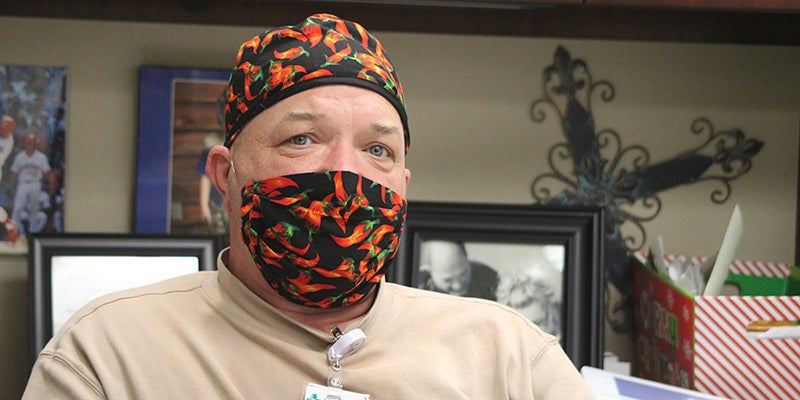Highland expects pandemic to have long term effects
Published 7:00 am Friday, April 17, 2020

- Personal protection: Highland Community Hospital Administrator Bryan Maxie wears a donated cloth facemask on Wednesday as he explains the long-term challenges facing healthcare providers. Photo by Cathy Cook
The impact of COVID-19 on healthcare infrastructure will be felt for a long time, according to Highland Community Hospital Administrator Bryan Maxie.
Although the challenge the hospital presently faces invovles getting through the COVID-19 pandemic, there will be financial and logistical challenges even after the number of new cases begins to decline.
“… none of us believe that healthcare moving forward will be the same as it was prior to this pandemic,” said Maxie.
Healthcare providers will have to figure out how to transition from a lockdown, where hospital visitors are heavily restricted and elective procedures have come to a halt, back to some kind of normal.
That transition will probably come in gradual steps, said Maxie. The hospital will want to know who has and has not been tested for COVID-19 to avoid risk of contamination and may implement protocols in outpatient clinic areas to track patients, said Maxie.
Even when cases begin to decline, Maxie anticipates hospitals will be affected for 60 to 100 days after the later COVID-19 cases start, because COVID-19 patients are expected to remain in the hospital for a long period of time. Highland will most likely be dealing with effects from the pandemic into early fall, said Maxie.
“The conditions that the positive patients with COVID have and the toll it takes on their body—it takes them quite some time to recover,” said Maxie.
Maxie believes the hospital will still be treating COVID-19 patients at the peak of hurricane season, but is hopeful the critical mass of patients will be out of the facility by then. He does not think that the pandemic will negatively affect the hospital’s ability to respond to crises during hurricane season.
“We pray that the aftereffects of COVID-19 will be over by hurricane season, or at least the majority of it,” said Maxie.
More hospital staff have been cross trained in critical areas due to the pandemic, said Maxie. Additionally, steps taken by hospital staff to respond to COVID-19 should keep the facility prepared if it needs to treat an influx of patients at the spur of the moment. As in many other industries, the pandemic has created a financial crisis for healthcare facilities.
Many smaller facilities are struggling, because the services that bring in revenue like surgeries, cath labs, outpatient care and elective procedures, are way down, said Maxie.
“There’s not a lot of money coming in the door, but a tremendous amount is going out the door,” he said.
The federal stimulus packages should help healthcare facilities move forward, but currently it is unclear how much those funds will help, Maxie said.
“From an administrative perspective, I think our worst days are ahead of us versus behind us as we try to adapt to the position that this pandemic leaves us in,” said Maxie. Still, the hospital’s current focus is on providing care to patients and making it through the health crisis, he said. “We’ll worry about the other stuff later,” said Maxie.



